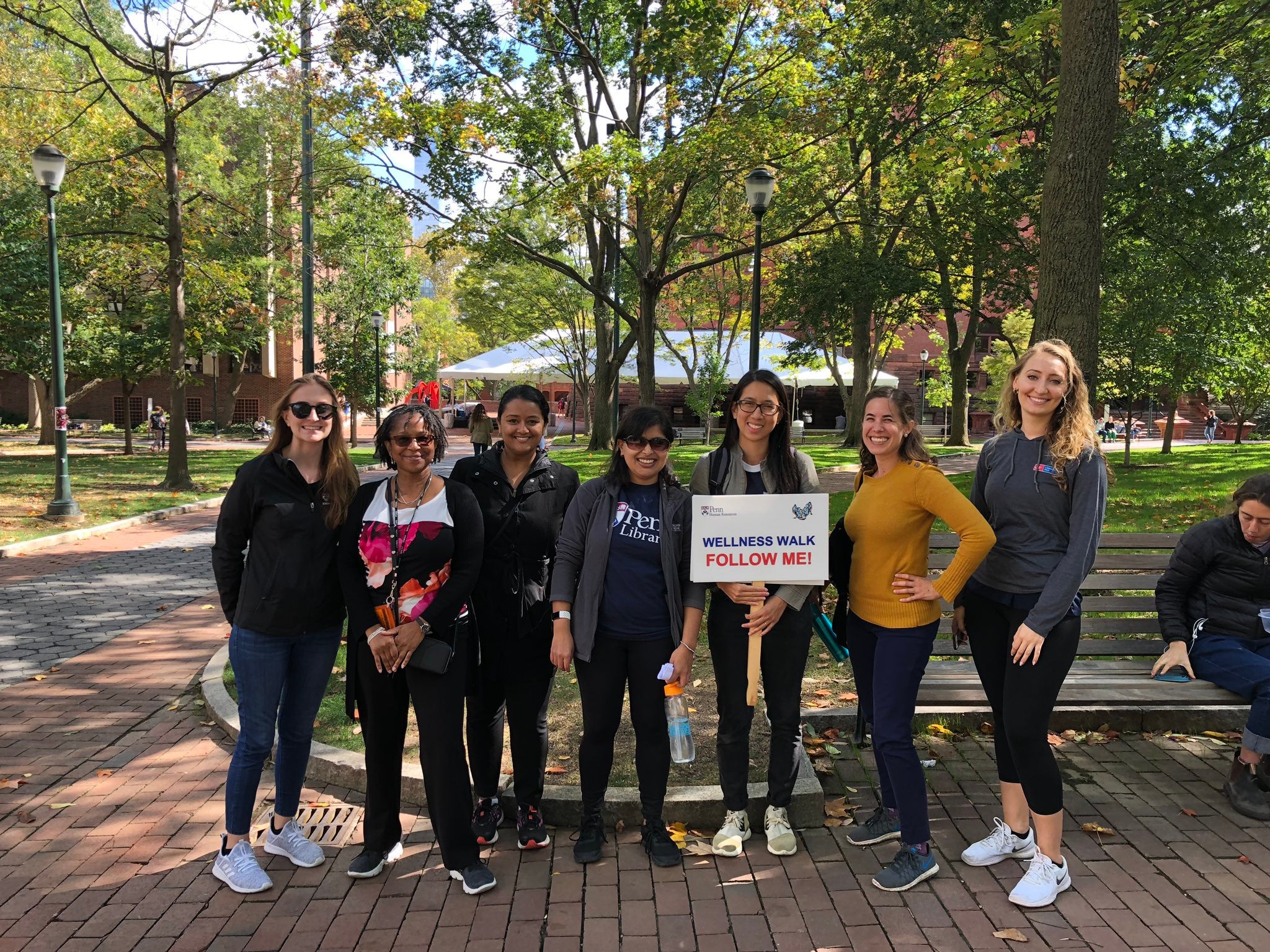Wellness Walks: Q&A with Aman Kaur

Last spring, Penn Medicine’s Center for Health Care Innovation (CHCI) launched Your Big Idea, a competition to crowdsource creative ideas for the promotion of wellness on campus. “We want you to think big,” the guidelines stated. “Proposals that cross departments and schools are strongly encouraged.”
One of the three proposals ultimately slated to receive funding came from Amanpreet (Aman) Kaur. Indeed, Kaur constantly collaborates across departments and schools: in addition to acting as the Biomedical Library’s inaugural Community Health and Engineering Librarian, she coordinates the Penn Libraries’ Inter-Professional Student Advisory Gatherings (IPSAG); serves on the Library Lounge team, the Group On Library Diversity (GOLD), and the 2020 Penn Student Affairs Leadership Team (SALT) Annual Conference Planning Committee; and is an Associate Fellow at the Center for Public Health Initiatives (CPHI).
Kaur’s winning idea was a series of themed walks intended to get sedentary students, staff, and faculty away from their desks and out onto campus. Each weekly “Wellness Walk” will feature a brief five- to seven-minute presentation on a given topic, then a one- to two-mile walk.
Kaur led the first Wellness Walk on Friday, October 4, when she presented on the evaluation of health news. The full—and regularly updated—schedule of walks is available here.

Describe your role as the Community Health and Engineering Librarian.
As the Engineering Librarian, I assist Doug McGee, the Director of Science Libraries, with collection development, reference, instructional, and other liaison services for the School of Engineering and Applied Science (SEAS) and any collaborations SEAS is a part of—including Penn Health-Tech and Penn STEM Alliance. As for the community health aspect of my role, I assist with a wide range of community health, health literacy, wellness, and other outreach initiatives, both on and off campus.
What’s an example of an off-campus community health initiative you’ve worked on?
In early June, Kiara Benson (a recent graduate of Penn’s Master of Public Health program) and I staffed the Penn Libraries table at Penn Presbyterian Medical Center’s Community Health Fair. We engaged dozens of West Philadelphians in games and activities that incorporated health information, and we handed out materials from the Biomedical Library’s Consumer Health Information Corner.
What concepts informed the framework of Themed Wellness Walks?
Elaine Weigelt from CPHI and I were inspired by the “Walk with a Future Doc” model. Walk with a Future Doc is a medical student-run, CPHI-funded initiative. On select Saturday mornings at the Kingsessing Recreation Center, medical students briefly discuss a health topic and then lead a walk.
While Weekly Themed Wellness Walks are based on this model, we plan to expand themes and topics to include other subject areas; we want to reflect the interdisciplinarity of Penn’s campus. In fact, it’s just a coincidence that our first month of scheduled Themed Wellness to Walks are health-focused; I think it’s because CPHI and the Biomedical Library both attract folks interested in health.
Why did you choose “evaluating health news” as your topic?
Richard James, the Undergraduate Nursing Librarian, and I offer an “Evaluating Health Websites & Apps” workshop upon request. At the beginning of October, I presented that talk at the Health Literacy Month kickoff event at the Common Press. The “Evaluating Health News” talk builds on the content of that workshop.
What are the objectives of this initiative?
We want to provide informal learning and networking opportunities for all students, staff, and faculty, and we want to promote physical and mental wellness. In fact, this initiative fulfills all eight dimensions of wellness: physical (walking), emotional and spiritual (stress reduction), social (network), intellectual and occupational (learning), environmental (the beauty of Penn’s campus), and financial (since it’s free to participate).
You identify one of the objectives of Wellness Walks as providing opportunities for informal networking. Can you say more about why such opportunities are important for students?
I think it’s important for students to network with their peers, staff, and faculty both inside and outside of their course of study. A chance encounter with someone new could lead to opportunities for career advancement, a business startup, collaborative research, or friendship.
On a personal note, I value networking because I moved around a lot during my adolescence and young adult years. It’s important to meet new people to establish a network, because your valuable connections will follow you regardless of your geographic location. I also don’t fit neatly into any of the three fields that I’ve studied, so I feel “in the zone” when I meet people also interested in interdisciplinary and interprofessional conversations.
What might be some future, non-health-focused themes?
All Penn students, staff, and faculty are welcome to serve as walk leaders and present about any topic of their choosing. Walk leaders can talk about personal research interests, class projects, fieldwork, student organizations, favorite historic buildings or landscape features or artwork on campus . . . the possibilities are limitless!
Date
November 4, 2019
